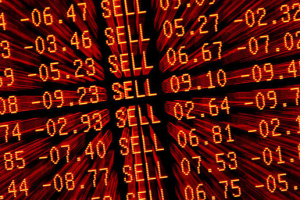The US and Australian share markets have seen some significant falls in the last few months. The Dow Jones hit an all time high of 26,617.71 but then fell 4 per cent by the end of the following week. Many investors are surprised at why markets can fall away so quickly, especially when not much seems to change with the underlying companies. In this article we discuss some of the reasons causing stock markets to fall.
Inflation
There have been recent concerns in the US that inflation may increase. This is after surprising figures showing exceptional US wage growth. Investors were concerned that these wage growth figures may create more aggressive rate hikes. This in turn caused a stock market sell off in the US in February 2018. When interest rates are hiked then the cost of borrowing becomes more expensive for companies than this increased cost can reduce earnings. Investors in the stock market do not see interest rate hikes as favourable. We have previously written on the effects of interest rates on the share market.
Rotation into Bonds
If interest rates are raised, investors will find bonds more attractive and will move their funds into bonds. If there are more sellers than buyers in the stock market, then this will create a fall in prices. Bonds are seen as having better returns than stocks when interest rates rise.
Overvalued stocks
Stocks may be overvalued, which means the company is expensive compared to the earnings outlook or price-earnings ratio (P/E ratio). As these companies are overvalued and prices are not justified by the fundamentals of the company, then the price of the stock is expected to drop. Stocks will therefore eventually fall into line with their fundamental values. This occurred during the dot com bubble where share prices did not reflect the future earnings performance of these stocks. When institutional investors started liquidating stocks then the stock price dropped. This then created a domino affect as other traders followed with their own selling.
Emotion
When anything rises in value, investors may have a fear of missing out and want to take a position. You can see this happening with Bitcoin and housing where prices have continued to climb at unprecedented levels. Investors see this upwards momentum and think the investment will continue to go up. As more and more investors think the same way, the prices continue to rise. Irrational exuberance driven by emotion can cause stocks to inflate. However, when values start to fall, investors will start to sell off their positions and this will decrease values. This of course causes the stock market to fall. When the GFC hit, investors panicked and starting selling their stocks. There was irrational selling as fear became the prevailing emotion during that period.
Investing on a Margin Loan
One of the causes of the stock market crash of 1929 was buying on margin. Investors only needed to put down 10-20% cash and could borrow the difference. There was a lot of confidence in the stock market and investors assumed it would continue to go up. As more people borrowed money to invest in stocks, the share prices accelerated as the demand for stocks increased. This created irrational exuberance. But when the stock markets started to fall, people panicked and also sold off their positions. Lenders saw this downward movement of the stock market and were concerned borrowers would lose too much value in their portfolios and not be able to pay back their loan. To ensure the loans were paid, they forced investors to pay back their loans immediately. This created further market depreciation as many borrowers were trying to sell their shares to pay back their loans. All of this was happening while there were few buyers in the market.
Recession
Companies suffer during periods of recession as people may spend less on goods and services if they are unemployed or concerned about the security of their job. This affects earnings growth and other fundamental factors used to value a stock. This in effect would lower stock prices and cause a fall in the stock market. Another reason is people are also less inclined to invest in the stock market as they may need money to pay for bare necessities. Households will only invest if there are surplus funds after living expenses have been paid. Conservative investors may see the drop in value of the stock market and decide to liquidate their positions to cash to prevent further share portfolio devaluation. This rush to sell securities will then cause further depreciation in the stock price which will then provoke other investors to sell.
Lauren Hua is a private client adviser at Fairmont Equities.
Sign up to our newsletter. It comes out every week and its free! You can leave your email with us via the form on the right-hand side of this page.
Otherwise you can email us at mail@fairmontequities.com
Disclaimer: The information in this article is general advice only. Read our full disclaimer HERE.
Like this article? Share it now on Facebook and Twitter!

